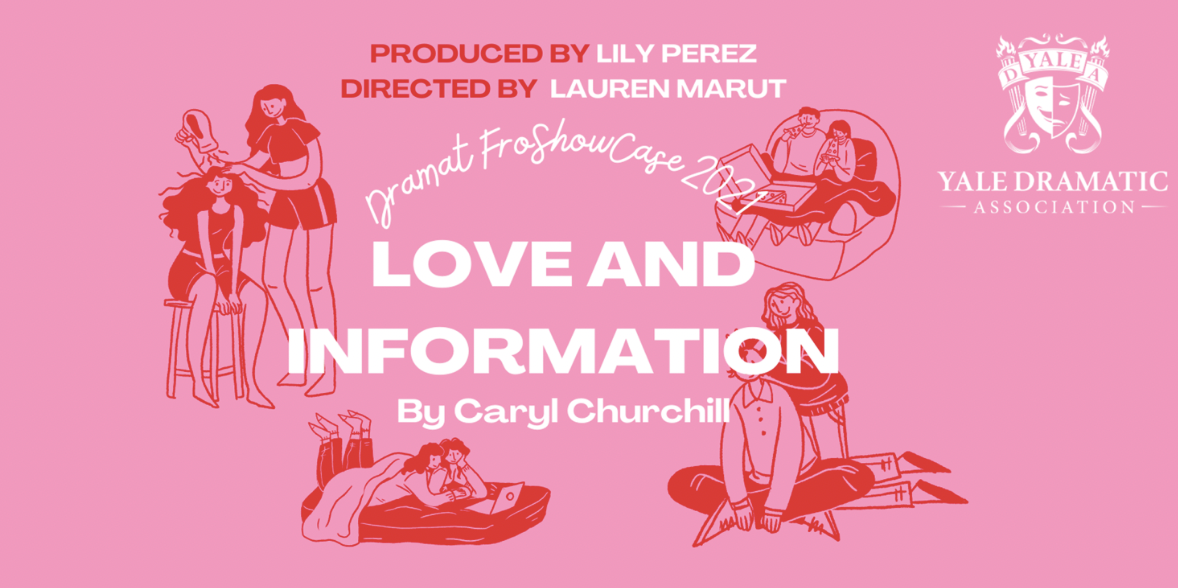
Courtesy of Lily Perez
Last weekend, the Yale Dramatic Association presented “Love and Information” — a play by British playwright Caryl Churchill — as one of four parts of the Dramat’s 2021 FroShowCase. The show consisted of 57 vignettes ranging from a few seconds to several minutes, each focusing on moments in the modern world of mass information.
Dramat’s FroShowCase is an annual show staffed, crewed and performed entirely by first-year students. “Love and Information” is a virtual compilation of stand-alone miniscenes covering ups and downs in relationships, connected by people’s shared experience of the information age. With no overarching plot or consistent characters, the play allowed for flexibility and creative freedom.
“A common drawback of all Zoom performances now is a difficulty to hold audience members’ attention through the computer screen,” said Lauren Marut ’25, the show’s director. “By choosing a play made of short and sporadic scenes, we sought to keep the viewers fully engaged and wondering what happens next.”
Despite having a cast of only eight first years, “Love and Information” included over 100 characters. During the rehearsal process, actors worked together with Marut to develop a unique character for each of their scenes.
According to producer Lily Perez ’24, the team wanted to engage many different first-year actors without feeling the need to cast people of a certain gender identity, race or ethnicity. They aimed to make the show inclusive and accessible for all, Perez said.
The production team also worked to incorporate different elements from Zoom into its virtual adaptation. Vignettes were presented in different formats: live performances, recorded videos from actors’ personal lives, text message pop-ups and screen sharing.
According to Perez, it is hard to replicate locational settings, such as a mall or an amusement park, realistically on Zoom. Most virtual shows adapt the perspective of a FaceTime call to circumvent filming difficulties. Instead of following that approach, the team decided to play with the idea “of what else a camera could be.”
“There is so much to be gained in Zoom theater,” Marut said. “One huge advantage is a forced perspective that gives freedom to precisely shape how the audience sees the performers and perceives the scene in general.”
The transition to a virtual format also shifted priorities for the production team. For example, rather than focusing on designing the show’s set as in a live performance, they instead worked on shipping costumes and sets to the cast.
The possibility of unstable internet connections and audio issues, particularly for two-person scenes, posed another challenge. In an effort to prevent those issues, the production team worked with actors on workshopping improvisations in scenes in case of connectivity issues on their partner’s end.
According to audience members during the performance, the show was reminiscent of the “beauty of everyday life” that can be found in small conversations and interactions with other people.
“Especially during the pandemic, I feel like we’ve all been so acutely aware of the things that we’ve lost and the connections with our loved ones that we miss out on,” Marut said. “But it’s been much harder to take stock of the things that we’ve gained or those more constant ones that we can still love and appreciate. I hope our show will demonstrate that even with our options so hugely limited, there are plenty of funny, sweet and exciting moments in life we have an opportunity to enjoy.”
The Dramat was founded in 1900.
Tania Tsunik | tania.tsunik@yale.edu







